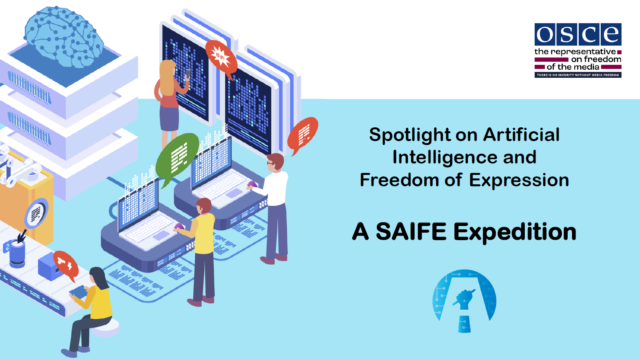AI Policy & Governance, Elections & Democracy, European Policy, Free Expression, Privacy & Data
EU Tech Policy Brief: January 2023
This is the January 2023 issue of the Centre for Democracy & Technology Europe‘s monthly Tech Policy Brief. It highlights some of the most pressing technology and internet policy issues under debate in Europe, the U.S., and internationally, and gives CDT’s perspective on them. Our aim is to help shape policies that advance our rights in a digital world. Please do not hesitate to contact our team in Brussels: Iverna McGowan, Asha Allen, and Ophélie Stockhem.
CDT Europe Marks Human Rights Day
In a new blog post marking International Human Rights Day, CDT Europe Director Iverna McGowan celebrated key wins for human rights and technology in the EU, such as the adoption of the EU Digital Services Act (DSA). McGowan also argued that upcoming legislation, namely the EU Artificial Intelligence Act, should not preclude the protection of the very most at-risk and vulnerable groups.
McGowan outlined how the risk-based approach of the EU AI Act limits the legislation’s power, and illustrated current attempts to preclude the protection of migrants, asylum seekers, and refugees from the protections the Regulation aims to provide, which were also pointed to in a civil society joint open letter initiated by EDRi and signed by CDT.
McGowan also raised concerns about bias in AI decision-making and the risks stemming from the use of biometric categorisation systems, concluding with a call to EU lawmakers to ensure that AI applications in the context of migration are correctly categorised as posing either very high or unacceptable risks.
CDT Europe Joins the Discussions at the 6th Annual Future of Speech Online Event

On 8 December 2022, CDT Europe’s Advocacy Director for Europe, Online Expression & Civic Space Asha Allen joined the 6th Annual Future of Speech Online Event, hosted by the Center for Democracy & Technology and Stand Together Trust.
Speaking at a Fireside Chat with Werner Stengg, Digital Expert from the Cabinet of the Executive Vice-President of the European Commission Margarethe Vestager, Allen discussed how the cabinet approached and played a role in the drafting of the EU Digital Services Act — and, in particular, how it struck the balance between tackling illegal content and preserving freedom of expression. Allen and Stengg exchanged on the specific challenges drafting the horizontal legislation posed, and the obstacles the European Commission team encountered in the process, such as the lobbying pressure — which, though heightened given the significance of the legislation, helped shape consensus on critical issues such as preserving freedom of expression.
The conversation concluded with reflections on the potential influence of the Digital Services Act in the years to come.
CDT Europe Advocacy Director Joins Women of Europe Awards’ Side Event on the Threat of Anti-Gender Movements in Europe
On 6 December, Asha Allen joined a side event to the 2022 Women of Europe Awards, organised by the European Movement International and the European Women’s Lobby, for an online panel on the threat of anti-gender movements in Europe.
In the context of the broader discussion on combating gender-based violence (GBV), in which Europe has experienced an increase in the use of online tools to spread disinformation, anti-women rights narratives, and harmful gender stereotypes, Allen emphasised that GBV exists on a spectrum and thus has no “one size fits all” solution. She spoke of the need to tackle online GBV by adopting clear, proportionate legislative frameworks, and coupling them with effective due diligence obligations for platforms that increase transparency and accountability — all of which must be combined with independent civil society oversight.
Allen outlined the need to specifically address risks raised by gendered disinformation, which characterises European anti-gender movements, and the negative impact the phenomenon has for civic discourse, democratic participation, and gender-based violence. She also argued that it is important for hard-won provisions — such as the newly adopted EU Digital Services Act — to integrate intersectional methodologies so they can avoid becoming empty shells.
CDT Europe Takes Stock of its Second Civil Society Roundtable Discussion on the Digital Services Act
In a new blog, CDT Europe reviewed the second event in our Civil Society Roundtable Series in collaboration with the Open Government Partnership, which on this occasion focused on the upcoming implementation of the EU Digital Services Act.
The successful event brought together an array of civil society, institutional, and government experts to discuss the methods to effectively implement the Digital Services Act in a manner that best protects democracy and human rights. Participants discussed challenges in accomplishing this goal, and concrete methodologies to ensure civil society involvement in shaping implementation and accountability efforts.
Iverna McGowan, Director of the CDT Europe office, emphasised the importance of maintaining similar fora for stakeholders to come together to exchange and work towards shaping solutions to pressing human rights challenges in the digital world, and to foster a deeper understanding of the fundamental rights and governance issues among the EU and its member states.
CDT Europe Advocacy Director Joins OSCE Panel on AI and Automated Decision-Making

On 16 December 2022, CDT Europe and the Montreal Institute for Genocide and Human Rights Studies co-hosted a joint panel discussion at the OSCE SAIFE Expedition: Spotlight on AI and Free Expression Event, which focused on AI, automated decision-making, and the uses of AI in promoting newsworthy and public interest content online governance in times of crisis.
CDT Europe’s Asha Allen co-facilitated a discussion between civil society and academic representatives on the role of AI and automated decision-making in understanding and countering gendered hate and harassment online, such as gendered disinformation and online GBV. The panel included Lucina Di Meco, Co-Founder of #ShePersisted, Lauren Salim, Project Leader at the Montreal Institute on the Canadian Women Leader’s Digital Defence, and Professor Lorna Woods from the University of Essex, expert on a model code for dealing with violence against women.
During the discussion, Allen raised concerns about the ‘chilling effect’ of online harm on women’s equitable participation in representative politics and democracy. She outlined CDT’s research on the prevalence of gendered disinformation and on the capabilities, limitations, and risks of automated tools for analysing online content. In particular, Asha highlighted the lack of contextual understanding of automated decision-making systems when it comes to user-generated content, and the limited robustness of these systems as they struggle to perform adequately in the context of content moderation. Allen concluded by recommending that policymakers adopt a multi-pronged and research-informed approach.
Don’t forget to check out CDT’s publications for this month, and to sign up for CDT’s other newsletters!
- Brief – Hidden Harms: Student Activity Monitoring after Roe V. Wade
- International Human Rights Day: EU States and Institutions Must Not Fail the Most Vulnerable, by CDT Europe Office Director Iverna McGowan


